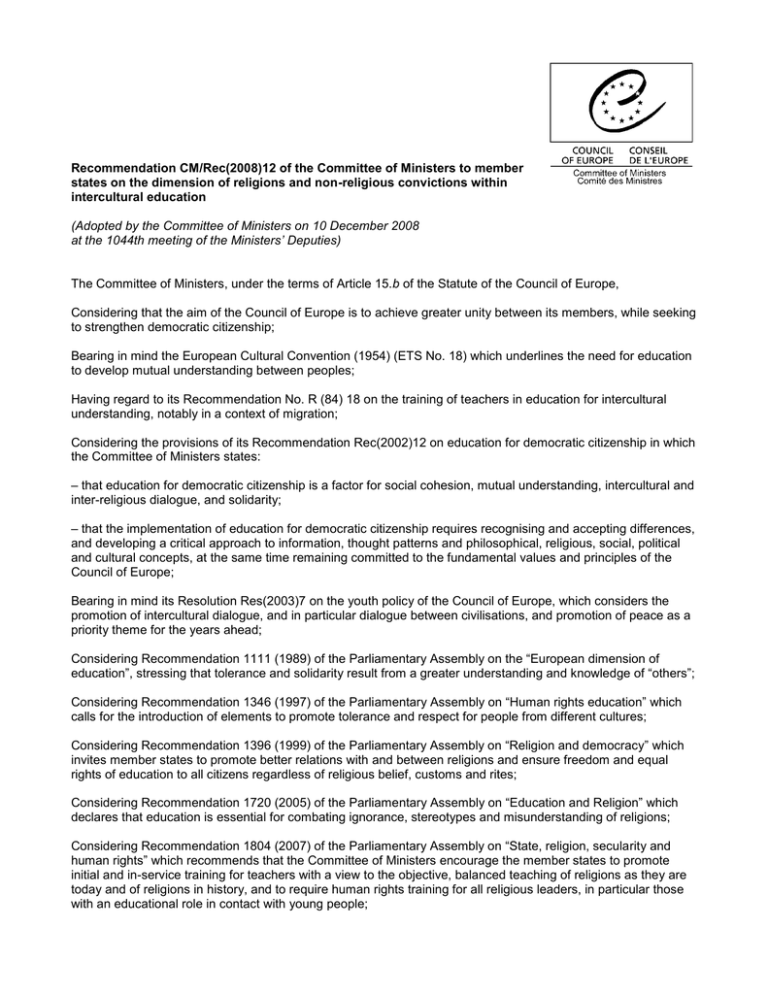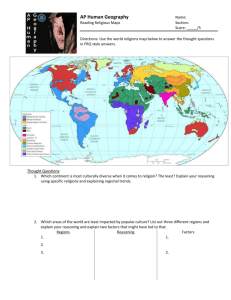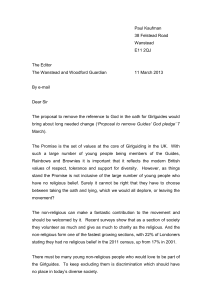Recommendation CM/Rec(2008)12 of the Committee of Ministers to member
advertisement

Recommendation CM/Rec(2008)12 of the Committee of Ministers to member states on the dimension of religions and non-religious convictions within intercultural education (Adopted by the Committee of Ministers on 10 December 2008 at the 1044th meeting of the Ministers’ Deputies) The Committee of Ministers, under the terms of Article 15.b of the Statute of the Council of Europe, Considering that the aim of the Council of Europe is to achieve greater unity between its members, while seeking to strengthen democratic citizenship; Bearing in mind the European Cultural Convention (1954) (ETS No. 18) which underlines the need for education to develop mutual understanding between peoples; Having regard to its Recommendation No. R (84) 18 on the training of teachers in education for intercultural understanding, notably in a context of migration; Considering the provisions of its Recommendation Rec(2002)12 on education for democratic citizenship in which the Committee of Ministers states: – that education for democratic citizenship is a factor for social cohesion, mutual understanding, intercultural and inter-religious dialogue, and solidarity; – that the implementation of education for democratic citizenship requires recognising and accepting differences, and developing a critical approach to information, thought patterns and philosophical, religious, social, political and cultural concepts, at the same time remaining committed to the fundamental values and principles of the Council of Europe; Bearing in mind its Resolution Res(2003)7 on the youth policy of the Council of Europe, which considers the promotion of intercultural dialogue, and in particular dialogue between civilisations, and promotion of peace as a priority theme for the years ahead; Considering Recommendation 1111 (1989) of the Parliamentary Assembly on the “European dimension of education”, stressing that tolerance and solidarity result from a greater understanding and knowledge of “others”; Considering Recommendation 1346 (1997) of the Parliamentary Assembly on “Human rights education” which calls for the introduction of elements to promote tolerance and respect for people from different cultures; Considering Recommendation 1396 (1999) of the Parliamentary Assembly on “Religion and democracy” which invites member states to promote better relations with and between religions and ensure freedom and equal rights of education to all citizens regardless of religious belief, customs and rites; Considering Recommendation 1720 (2005) of the Parliamentary Assembly on “Education and Religion” which declares that education is essential for combating ignorance, stereotypes and misunderstanding of religions; Considering Recommendation 1804 (2007) of the Parliamentary Assembly on “State, religion, secularity and human rights” which recommends that the Committee of Ministers encourage the member states to promote initial and in-service training for teachers with a view to the objective, balanced teaching of religions as they are today and of religions in history, and to require human rights training for all religious leaders, in particular those with an educational role in contact with young people; Considering Recommendation 1805 (2007) of the Parliamentary Assembly on “Blasphemy, religious insults and hate speech against persons on grounds of their religion” which recommends that the Committee of Ministers instruct its competent steering committee to draw up practical guidelines for national ministries of education intended to raise understanding and tolerance among students with different religions; Having regard to the European conference “The religious dimension of intercultural education” (Oslo, 6-8 June 2004), which identified the necessary conditions for applying the religious dimension of intercultural education in member states’ schools in the light of the results of the 21st session of the Standing Conference of European Ministers of Education (Athens, 10-12 November 2003); Bearing in mind the Wroclaw Declaration on fifty years of European cultural co-operation (10 December 2004) which underlined the importance of systematically encouraging intercultural and inter-religious dialogue based on the primacy of common values, as a means of promoting awareness and understanding of each other, preventing conflicts, promoting reconciliation and ensuring the cohesion of society, through formal and non-formal education; Having regard to the Action Plan adopted at the Third Summit of Heads of State and Government (Warsaw, 16-17 May 2005) which makes explicit reference to intercultural dialogue and to the specific challenges of religious diversity; Considering the previous initiatives of the Commissioner for Human Rights in the field of intercultural dialogue and in particular the “Volga Forum Declaration” (2006), adopted by the participants of the International Conference on “Dialogue of Cultures and Inter-Faith Co-operation” held in Nizhniy Novgorod from 7 to 9 September 2006, which called for the Council of Europe to enter into dialogue with religious organisations, underpinned by universal values and principles; Considering the Final Declaration of the European Conference on “The religious dimension of intercultural dialogue”, San Marino, 23 and 24 April 2007; Bearing in mind the White Paper on Intercultural Dialogue “Living together as equals in dignity” launched at its 118th Session (Strasbourg, 7 May 2008), which recalls that the vision of our cultural diversity should be based on the knowledge and understanding of the main religions and non-religious convictions of the world and of their role in society; Recalling the Council of Europe 2008 Exchange on the religious dimension of intercultural dialogue (Strasbourg, 8 April 2008) which underlined, inter alia, the importance in pluralist democracies, for all pupils to know and understand, during their school years, world views different from their own; Having regard to the setting up in Oslo (Norway) of the “European Resource Centre on education for intercultural understanding, democratic citizenship and human rights” which will co-operate with the Council of Europe and the mission and mandate of which is to support and to promote further the work of the Council of Europe in the field of education for intercultural understanding, democratic citizenship and human rights, including the dimension of religions and non-religious convictions, and to contribute to the implementation of the Council of Europe’s educational standards; Noting that the Steering Committee for Education’s (CDED) project “The new challenge to intercultural education: religious diversity and dialogue in Europe” (2002-2005) has made it possible, amongst other things: – to make considerable progress in the conceptual approach to, the content of and the learning methods for the religious dimension of intercultural education; – to underline the fundamental importance of taking into account the religious dimension of intercultural education in order to promote mutual understanding, tolerance and a culture of “living together”; – to put forward proposals for innovative teaching approaches and learning strategies which take into account religious diversity within intercultural dialogue; – to produce a reference book containing a whole series of concepts and pedagogical approaches to make teachers aware of the religious dimension of intercultural education; 1. Recommends that the governments of member states, with due regard for their constitutional structures, national or local situations and educational system: a. draw on the principles set out in the appendix to this recommendation in their current or future educational reforms; b. pursue initiatives in the field of intercultural education relating to the diversity of religions and non-religious convictions in order to promote tolerance and the development of a culture of “living together”; c. ensure that this recommendation is brought to the attention of the relevant public and private bodies (including religious communities and other convictional groups), in accordance with national procedures; 2. Calls on the Secretary General of the Council of Europe to bring this recommendation to the attention of the States Party to the European Cultural Convention that are not members of the Council of Europe. Appendix to Recommendation CM/Rec(2008)12 Scope and definitions 1. The recommendation’s aim is to ensure taking into account the dimension of religions and non-religious convictions within intercultural education as a contribution to strengthen human rights, democratic citizenship and participation, and to the development of competences for intercultural dialogue, at the following levels: – education policies, in the form of clear-cut education principles and objectives; – institutions, especially through open learning settings and inclusive policies; – professional development of teaching staff, through adequate training. 2. For the purpose of this recommendation “religions” and “non-religious convictions” are considered as cultural facts within the larger field of social diversity. 3. Religious and non religious convictions are diverse and complex phenomena; they are not monolithic. In addition, people hold religious and non-religious convictions to varying degrees, and for different reasons; for some such convictions are central and may be a matter of choice, for others they are subsidiary and may be a matter of historical circumstances. The dimension of religions and non-religious convictions within intercultural education should therefore reflect such diversity and complexity at a local, regional and international level. Principles for taking the dimension of religions and non-religious convictions into account in the framework of intercultural education 4. The following principles should form the basis and define the perspective from which religions and nonreligious convictions have to be taken into account in a framework of intercultural education: – the principle of the freedom of conscience and of thought includes the freedom to have a religion or not to have one, and the freedom to practice one's religion, to give it up or to change it if one so wishes; – agreement that religions and non-religious convictions are at least “cultural facts” that contribute, along with other elements such as language and historical and cultural traditions to social and individual life; – information on and knowledge of religions and non-religious convictions which influence the behaviour of individuals in public life should be taught in order to develop tolerance as well as mutual understanding and trust; – religions and non-religious convictions develop on the basis of individual learning and experience, and are not entirely predefined by one’s family or community; – an interdisciplinary approach to education in religious, moral and civic values should be encouraged in order to develop sensitivity to human rights (including gender equality), peace, democratic citizenship, dialogue and solidarity; – intercultural dialogue and its religious and non-religious convictions dimension are an essential precondition for the development of tolerance and a culture of “living together”, as well as for the recognition of our different identities on the basis of human rights; – the manner in which the dimension of religious and non-religious convictions within intercultural education is introduced in practice could take into account the age and maturity of pupils to whom it is addressed as well as the already existing best practices of the respective member states. Objectives of an intercultural approach concerning the religious and non-religious convictions dimension in education 5. Education should develop intercultural competences through: – developing a tolerant attitude and respect for the right to hold a particular belief, attitudes based on the recognition of the inherent dignity and fundamental freedoms of each human being; – nurturing a sensitivity to the diversity of religions and non-religious convictions as an element contributing to the richness of Europe; – ensuring that teaching about the diversity of religions and non-religious convictions is consistent with the aims of education for democratic citizenship, human rights and respect for equal dignity of all individuals; – promoting communication and dialogue between people from different cultural, religious and non-religious backgrounds; – promoting civic-mindedness and moderation in expressing one’s identity; – providing opportunity to create spaces for intercultural dialogue in order to prevent religious or cultural divides; – promoting knowledge of different aspects (symbols, practices, etc.) of religious diversity; – addressing the sensitive or controversial issues to which the diversity of religions and non-religious convictions may give rise; – developing skills of critical evaluation and reflection with regard to understanding the perspectives and ways of life of different religions and non-religious convictions; – combating prejudice and stereotypes vis-à-vis difference which are barriers to intercultural dialogue, and educating in respect for equal dignity of all individuals; – fostering an ability to analyse and interpret impartially the many varied items of information relating to the diversity of religions and non-religious convictions, without prejudice to the need to respect pupils’ religious or non-religious convictions and without prejudice to the religious education given outside the public education sphere. Requirements for dealing with the diversity of religions and non-religious convictions in an educational context 6. The following attitudes should be promoted in order to remove obstacles that prevent a proper treatment of the diversity of religions and non-religious convictions in an educational context: – recognising the place of religions and non-religious convictions in the public sphere and at school as topic for discussion and reflection; – valuing cultural and religious diversity as well as social cohesion; – recognising that different religions and humanistic traditions have deeply influenced Europe and continue to do so; – promoting a balanced approach of the presentation of the role of religions and other convictions in history and cultural heritage; – accepting that religions and non-religious convictions are often an important part of individual identity; – recognising that the expression of religious allegiance at school, without ostentation or proselytising, exercised with due respect for others, public order and human rights, is compatible with a secular society and the respective autonomy of state and religions; – overcoming prejudices and stereotypes concerning religions and non-religious convictions, especially the practices of minority groups and immigrants, in order to contribute to the development of societies based on solidarity. Teaching aspects of an intercultural approach to religions and non-religious convictions in education 7. In order to encourage consideration of the diversity of religions and non-religious convictions in the educational context, and to promote intercultural dialogue, the following educational preconditions and learning methods can be seen as highly appropriate examples: 7.1. Educational preconditions – sensitivity to the equal dignity of every individual; – recognition of human rights as values to be applied, beyond religious and cultural diversity; – communication between individuals and the capacity to put oneself in the place of others in order to establish an environment where mutual trust and understanding is fostered; – co-operative learning in which peoples of all traditions can be included and participate; – provision of a safe learning space to encourage expression without fear of being judged or held to ridicule; 7.2 Various learning methods – use of “simulations” to create teaching situations involving dialogue, dilemmas, and reflection; – encouraging pupils to reflect objectively on their own and others’ existence and views; – role-playing in an attempt to reproduce and understand the point of view and emotions of others; – use of “living libraries”; – co-operation rather than competition in order to construct a positive self-image; – the development of appropriate pedagogical approaches such as: – a phenomenological approach aimed at cultivating a knowledge and understanding of religions and non-religious convictions as well as respect for other persons irrespectively of their religious and non-religious convictions; – an interpretative approach which encourages a flexible understanding of religions and non-religious convictions and avoids placing them in a rigid pre-defined framework; – an approach enabling pupils to respect and engage in dialogue with other persons possessing other values and ideas; – a contextual approach taking account of local and global learning conditions. Consequences for state policies on the initial and in-service training of teaching staff 8. Member states, in accordance with the principles, objectives and teaching approaches stated above, are requested to: – emphasise that training is one of the main ways of increasing the competences of teachers who, as such, also have a duty to help build a more tolerant and cohesive society; – provide teachers with the training and means to acquire relevant teaching resources with the aim to develop the necessary skills for taking into account the religions and non-religious convictions within an intercultural educational approach ; – provide training that is in conformity with the European Convention on Human Rights. Such training should be objective and open minded; – develop training in methods of teaching and learning which ensure education in democracy at local, regional, national and international level; – encourage the introduction of multiperspectivity in the training programs of teachers, as a key element that takes into account the widespread of different points of view in teaching and learning; – train teachers to develop approaches that enable them to: o o o o o o o o – constitute rich and varied teaching resources; exchange resources and successful experiences regarding the dimension of religions and nonreligious convictions; promote critical evaluation of the reliability and validity of sources; facilitate opportunities for exchanges and dialogue between pupils from different cultural environments; take account of the local and the global nature of the intercultural dialogue; exercise constant vigilance, with due regard for legal rules and the freedom of expression, in order to combat the dissemination of proselytising, racist or xenophobic content; be aware of the importance to establish positive relationships with parents, local community and religious communities (which can be involved sometimes for visiting places of worship, etc.); take account of the widespread and growing uses of new information technologies. make provision, when devising training policies, for the necessary resources for research and evaluation of the results, successes and difficulties as well as practices.





